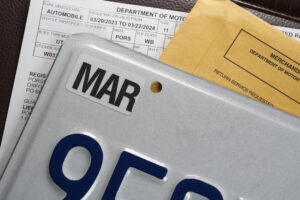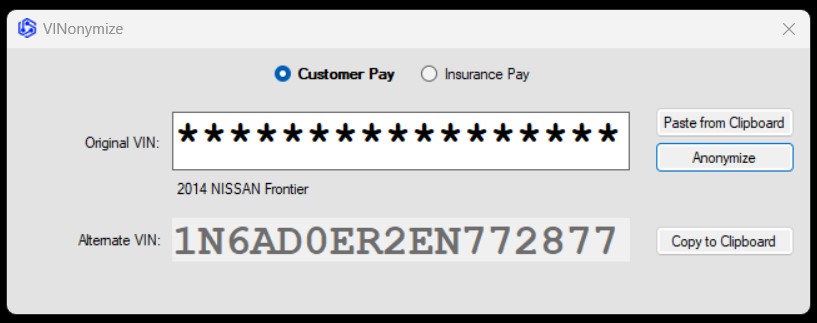
DataTouch to launch ‘foolproof way’ of protecting customer PII
By onBusiness Practices | Technology
DataTouch has launched VINAnonymize, a new technology that the company says prevents collision repair estimate information from being used by vehicle identification number (VIN) reporting services, such as Carfax and Experian AutoCheck.
DataTouch designed the software to allow a shop user to anonymize a VIN, and in turn, help protect customers’ personally identifiable information (PII).
The collection and selling of PII by third parties is becoming a difficult problem for not only the automotive and collision repair industries but for businesses across the board that collect customer information to provide services including name, address, phone number, and more. The issue has prompted several states to enact legislation that requires companies to provide disclosures and allow customers to opt out of having their information shared and/or sold. Federal legislation to protect consumer data collection and privacy has also been introduced and debated without passage.
DataTouch Managing Director Pete Tagliapietra told Repairer Driven News that VINAnonymize runs independently on the shop’s computer system so it doesn’t affect or integrate with anything else, including VIN decoding or parts requests and fulfillment. The VIN is anonymized by year, make, and model without disrupting the last eight characters.
VINs are entered into the DataTouch Anonymizer, and once anonymized, the data can be exported to the estimating system provider.
Tagliapietra told RDN that DataTouch has completed extensive research and testing to make sure VINs entered into VINAnonymize are still decoded correctly, including all three estimating systems and government agencies such as the National Insurance Crime Bureau (NICB) and the National Highway Traffic Safety Administration (NHTSA). DataTouch has yet to come across a program that won’t accept any of its anonymized VINs.
The anonymization also isn’t one-size-fits-all, he said.
“It creates a VIN on a vehicle that doesn’t exist,” Tagliapietra said. “We look at the manufacturer and we look at the model and see where the vehicle’s manufactured and then the software is programmed to decide how to anonymize it.
“We don’t want anybody to say, ‘This VIN doesn’t work,’ so we’ve tested that ad nauseam to make sure that doesn’t happen… We know after more than 18 months of research that there’s no way anybody’s going to be able to stop the information [from] being copied and sold. It’s impossible at this point in time. There are simply too many companies that take the data and sell it… We came to the conclusion that it’s not about trying to stop certain data pumps from running. It’s about intercepting the process and disrupting it.”
Tagliapietra said DataTouch’s new software application is a “foolproof way” of giving customers the option to opt out of having their VIN sold. Plus, no estimating system or vehicle history reporting companies, such as Carfax and Experian, will be able to pick up the correct VIN.
“Someone’s still going to take it and sell it to Carfax, but it’ll never get a hit and the reason it will never get a hit is because that vehicle doesn’t exist,” he said. “It protects the shop. It protects the vehicle owner… It will only pick up the anonymized VIN.”
However, if data is sold with an anonymized VIN, while it won’t be worth anything to the vehicle history providers, the raw data that goes with the estimates, such as details about parts used and their prices, will still be collected. A solution to that is slated to come out during Q1 of this year, according to Tagliapietra. DataTouch plans to provide additional data security software releases that will help segment data.
“We see this as a big opportunity… particularly those high-line, high-end shops that repair expensive customer cars where the customer doesn’t turn it into their insurance company and they pay for it,” Tagliapietra said. “Or the rust repair or the restoration or anything that doesn’t involve a collision, but still ends up on Carfax.”
He provided some examples of customer-pay jobs that shops only provided estimates for but he said still ended up on Carfax with inaccurate information.
A customer brought in a 1996 Porsche for cosmetic restoration and the shop disassembled much of the car, painted it in pieces, and then put it back together, he said. Only an estimate was written and parts weren’t ordered through an estimating system; they were ordered by phone. However, according to Tagliapietra, the vehicle still ended up on Carfax.
“How does that happen? It’s obvious to us that the companies that have rights to that estimating provider’s data are selling the data in spite of what they’re trying to tell the industry,” Tagliapietra said. “We thought at the beginning that we could manage the process through data pumps. We’ve come to realize that that’s just not possible.”
Tagliapietra noted another example, which was provided at a meeting of the Collision Industry Conference (CIC) in 2022 by Aaron Schulenburg, executive director of the Society of Collision Repair Specialists (SCRS). A third-party company contacted him to sell data that they said could be a business opportunity for his member shops. The company, which Schulenburg didn’t name, said the data could be used by shops to contact customers who recently received quotes from other shops and solicit repairs at their shop instead.
According to Schulenburg, the company confirmed the word “quotes” was being used as a stand-in for “estimates,” and that the quotes could be from insurance carriers or shops. Everything from full name, home address, email, cell number, VIN, insurance carrier, and more was included.
Schulenburg said the company told him, “Through our data aggregation partners and processes we collect 86% of all quoted collision repairs in North America whether the quote is taken through a body shop or an insurance carrier. In other words, when a consumer takes their car in for a repair — whether if it’s an insurance carrier or not — that data goes into our system within 24 hours.”
When shops use VINAnonymize, VINs won’t show up on repair plans unless the shop pastes it in another field, like in a line item explanation at the end of the estimate, Tagliapietra said.
“DataTouch supports standardization and CIECA standards; however, we want to ensure transactions are secure and third parties don’t proliferate PII,” he said. “VIN Anonymizer is the first step that puts a security blanket around EMS and BMS.”
Since launching Data Auditor — another DataTouch product that helps identify what information and how often it is being swept from shop computer systems. Tagliapietra said several examples of data collection that shops weren’t aware was happening have been discovered.
“I don’t know how many shops are aware that when they write an estimate for an OEMCRN [OEM Certified Repair Network] program, every one of those programs collects every estimate, not just the OEM estimate,” he said. “If someone installed a data pump and they no longer do business with that company …those data pumps just continue to run.”
Information on VINAnonymize will be on DataTouch’s website by Friday night. Shops can also get information on VINAnonymize by calling 913-904-2848 or sending an email to salesadmin@datatouch.us.
Images
Featured image: Illustration provided by Bill Oxford/iStock
VINAnonymize screenshot provided by DataTouch

